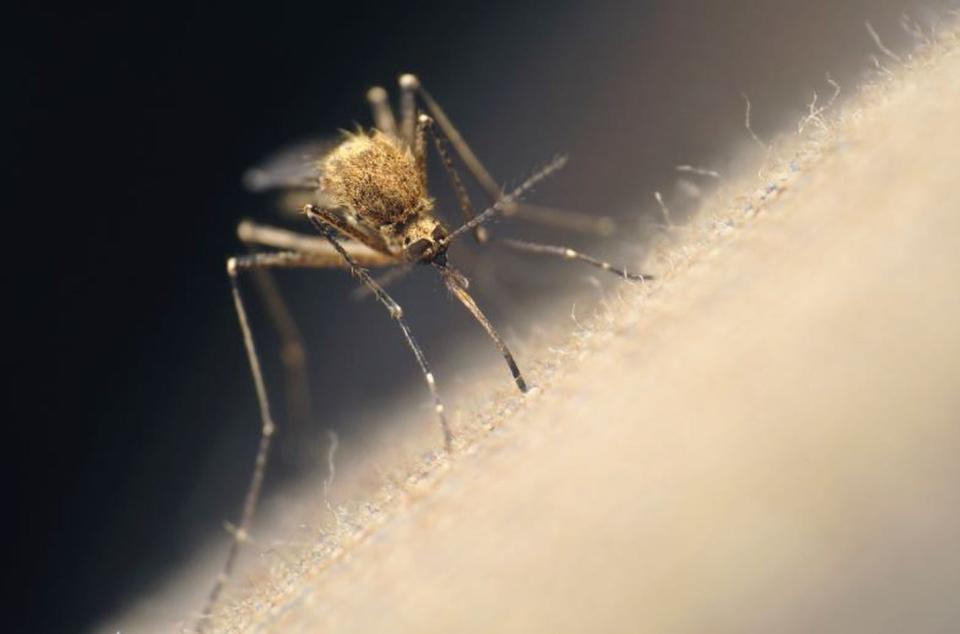EEE found in first Rhode Island mosquitoes this year – what to know
State agencies are reminding Rhode Islanders to protect themselves against mosquito bites after mosquitos in Rhode Island tested positive for two diseases that can sicken humans – Eastern Equine Encephalitis and West Nile Virus.
A mosquito sample collected in Glocester on Aug. 21 marked the first time this year that a sample has tested positive for EEE, the state Department of Environmental Management and state Department of Health announced in a news release Tuesday.

"Although extremely rare in humans, EEE is very serious. Approximately 30% of people with EEE die, andmany survivors have ongoing neurological problems," the agencies said.
Another mosquito sample, collected in Barrington on Aug. 21, tested positive for West Nile Virus. It was the fourth detection of that disease this summer, the agencies said.
"WNV is the leading cause of mosquito-borne diseases in the continental United States and is much more prevalent than EEE," the agencies said. "Fortunately, most people infected with WNV do not feel sick. About one in five people who are infected develop a fever and other symptoms. About one out of 150 infected people develop a serious, sometimes-fatal illness."
The other positive WNV samples were found in Westerly, but the agencies say WNV is probably present in mosquitoes statewide. "Mosquito-borne diseases become more prevalent in Southern New England as the season progresses," the agencies say.
More: Ick!: How do you get rid of slugs, bugs and ticks that are the gardener's bane?
Massachusetts has announced 82 and Connecticut has announced 63 positive samples of WNV in mosquitoes, but neither state has announced a finding of EEE, the agencies said.
The agencies are advising Rhode Islanders to reduce their exposure to mosquitoes until the first hard frost. Here are some tips from the DEM and Department of Health for reducing exposure (Additional information and tips are available on the Health Department's website:
How to protect yourself against West Nile, EEE
Put screens on windows and doors. Fix screens that are loose or have holes.
At sunrise and sundown (when mosquitoes are most active), consider rescheduling outdoor activities that occur during evening or early morning. If you must be outside, wear long-sleeved shirts and long pants and use bug spray.
Use EPA-approved bug spray with one of the following active ingredients: DEET (20-30% strength), picaridin, IR3535, and oil of lemon eucalyptus or paramenthane. Always read the label and follow all directions and precautions.
Do not use bug spray with DEET on infants under two months of age. Check the product label to find the concentration of DEET. The American Academy of Pediatrics recommends that repellents should contain no more than 30% DEET when used on children. Children should be careful not to rub their eyes after bug spray has been applied to their skin. Wash children’s’ hands with soap and water to remove any bug spray when they return indoors.
Put mosquito netting over playpens and strollers.
Remove mosquito breeding grounds
Remove items around your house and yard that collect water. Just one cup of water can produce hundreds of mosquitoes; an unused tire containing water can produce thousands of mosquitoes.
Clean your gutters and downspouts so they can drain properly.
Remove any water from unused swimming pools, wading pools, boats, planters, trash and recycling bins, tires and anything else that collects water and cover them.
Remove or treat any shallow water that can accumulate on top of a pool cover. Larvicide treatments, such as Mosquito Dunks, can be applied to kill immature mosquitoes. This environmentally friendly product is available at many hardware and garden stores and online.
Clean and change water in birdbaths at least once a week.
Best practices for horse owners
Horses are particularly susceptible to WNV and EEE. Horse owners are advised to vaccinate their animals early in the season and practice the following precautions:
Remove or cover areas where standing water can collect.
Avoid putting animals outside at dawn, dusk or nighttime, when mosquitoes are most active.
Insect-proof facilities where possible and use approved repellents frequently.
Monitor animals for symptoms of fever and/or neurological signs (such as stumbling, moodiness and/or loss of appetite) and report all suspicious cases to a veterinarian immediately. If you are unsure if your horse is properly vaccinated, you should consult with your veterinarian.
This article originally appeared on The Providence Journal: How to protect yourself from EEE, West Nile Virus found in RI mosquitoes

